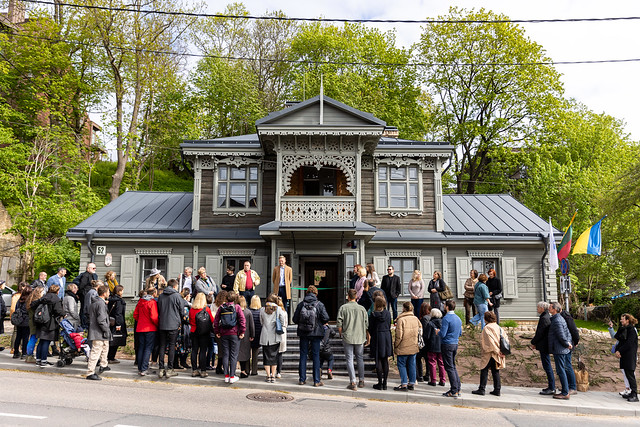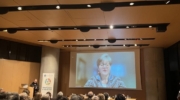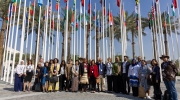EIB experts present financing opportunities for the cultural heritage sector at online masterclass
On 15 May, in a successful online masterclass with more than 200 attendees, experts from the European Investment Bank, the Bank of the European Union, presented financing and advisory services opportunities for the cultural heritage sector. The masterclass was organised by Europa Nostra and the EIB Institute.
Cultural heritage has been a long-standing area of funding and advisory services by the European Investment Bank and its philanthropic arm, the EIB Institute. Such funding and advisory services are concentrated in European countries and can range from conservation of UNESCO World Heritage Sites to urban renewal, notably in less developed European cities and regions.
Cultural heritage has a cohesive power which connects European people and communities. It is one of the 11 standards by which investment projects are assessed for EIB financing, and the EIB has supported many cultural heritage sites either directly or through urban framework loans where the borrowing entity pools together smaller projects. The EIB focuses mostly on the tangible aspects of cultural heritage including buildings, monuments and sites.
Happening now ➡️ Our online masterclass with @EIBInstitute on #funding & advisory services for #CulturalHeritage has just started. Not able to join? Stay tuned for the key takeaways below & soon on our website ⤵️🧵 pic.twitter.com/aNhpNBbEzD
— Europa Nostra (@europanostra) May 15, 2024
Following the introductory remarks by Guy Clausse, Executive Vice-President of Europa Nostra, and Bruno Rossignol, Head of Climate and Heritage Programme at the EIB Institute, the EIB experts presented the various financial products available to interested heritage stakeholders alongside eligibility requirements.
Katerina Zisimopoulou, Urban Specialist at the EIB, emphasised that “There are Public Policy Goals that are tied to all forms of financial products. These are requirements that need to be met in order for the financing to be approved.”
On @EIB & funding for #CulturalHeritage 💬 “We aim for a precautionary approach that protects #heritage, provides equitable sharing of benefits & raises awareness, appreciation & enhancement of the heritage itself in the city at hand” 🏙️ pic.twitter.com/An3RMh1oTK
— Europa Nostra (@europanostra) May 15, 2024
On funding for cultural heritage, Fabrizio Seminara, Senior Urban Development Specialist at the EIB, added: “We aim for a precautionary approach that protects heritage, provides equitable sharing of benefits and raises awareness, appreciation and enhancement of the heritage itself in the city at hand”.
Apart from the Public Policy Goals, EIB-funded projects need to be aligned with the 2015 Paris Agreement on Climate Change. The EIB experts shared with the participants a selection of relevant documents edited and published by the EIB, including:
- Urban Development Sector
- The EIB Group Climate Bank Roadmap
- Paris Alignment Framework
- Adaptation to Climate Change
- EIB Environmental and Social Standards
- Cohesion and Regional Development Overview 2023
- EIB Eligibility, excluded activities and excluded sectors list
- Economic Appraisal of Investment Projects
- EIB Group Operational Plan 2024-2026
But the EIB is not only about financing. On advisory services for cultural heritage, Patrizia Fagiani, Urban Specialist at the EIB, introduced JASPERS, a joint initiative between the EIB and the European Commission to support projects from the very beginning: “We come into play earlier, helping beneficiaries prepare better projects which deliver on promises, fulfil objectives and ensure optimal spending of public funding.”
On @EIB advisory services for #CulturalHeritage, we learnt about JASPERS, a joint @EIB & @EU_Commission initiative 💬“We come into play earlier, helping beneficiaries prepare better projects which deliver on promises, fulfil objectives & ensure optimal spending of public funding” pic.twitter.com/wCGFNeZ1oK
— Europa Nostra (@europanostra) May 15, 2024
One of the case studies presented was the financing of the Museum of Urban Wooden Architecture in Vilnius (circa 1.2M€) as part of a five-year framework loan (circa 47M€) with the city of Vilnius. The funding was used for the restoration of the building as well as to provide exhibition and event spaces, multi-functional education areas, a café, and an information centre. The Museum of Urban Wooden Architecture received a Europa Heritage Award / Europa Nostra Award in 2023.
The online masterclass in funding and advisory services for cultural heritage was the third out of a total of four masterclasses which Europa Nostra has organised in the framework of the European Cultural Heritage Agora Network Project (2022-2024), co-funded by the Creative Europe Programme of the European Union.
Thank you for joining us today 👏 An overview & recording of the event will be published soon on our website 📽️ https://t.co/fnsnJsVqlB #funding #advisoryservices #culturalheritage pic.twitter.com/7NZuAaA3ng
— Europa Nostra (@europanostra) May 15, 2024







